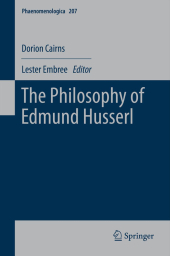 Neuerscheinungen 2014Stand: 2020-02-01 |
Schnellsuche
ISBN/Stichwort/Autor
|
Herderstraße 10
10625 Berlin
Tel.: 030 315 714 16
Fax 030 315 714 14
info@buchspektrum.de |

Dorion Cairns, Lester Embree
(Beteiligte)
The Philosophy of Edmund Husserl
Herausgegeben von Embree, Lester
2013. 2014. xviii, 310 S. 235 mm
Verlag/Jahr: SPRINGER NETHERLANDS; SPRINGER 2014
ISBN: 9400798563 (9400798563)
Neue ISBN: 978-9400798564 (9789400798564)
Preis und Lieferzeit: Bitte klicken
This comprehensive appraisal of one of the greatest and most influential philosophers of the 20th century results from Dorion Cairns´s remarkable association with Husserl, informed by a close personal relationship with the thinker that spanned some three years.
The present volume containing the dissertation of Dorion Cairns is the first part of a comprehensive edition of the philosophical papers of one of the foremost disseminators and interpreters of Husserlian phenomenology in North-America.
Based on his intimate knowledge of Husserl´s published writings and unpublished manuscripts and on the many conversations and discussions he had with Husserl and Fink during his stay in Freiburg i. Br. in 1931-1932 Cairns´s dissertation is a comprehensive exposition of the methodological foundations and the concrete phenomenological analyses of Husserl´s transcendental phenomenology.The lucidity and precision of Cairns´s presentation is remarkable and demonstrates the secure grasp he had of Husserl´s philosophical intentions and phenomenological distinctions. Starting from the phenomenological reduction and Husserl´s Idea of Philosophy, Cairns proceeds with a detailed analysis of intentionality and the intentional structures of consciousness. In its scope and in the depth and nuance of its understanding, Cairns´s dissertation belongs beside the writings on Husserl by Levinas and Fink from the same period.
1. The Transcendental Phenomenological Reduction: Husserl´s concept of the Idea of Philosophy.- a. Appendix to Chapter 1.- 2. General Nature of Intentionality.- 3. General Structure of the Act-Correlate.- 4. Thetic Quality.- 5. Act-Horizon.- 6. Founded Structures.- 7. Direct and Indirect, Impressional and Reproductive, Consciousness.- 8. Evidence.- 9. Fulfilment.- 10. Pure Possibility.- 11. Recapitulation and Program. 12. The Egological Reduction.- 13. Primordial Sense-Perception.- 14. Primordial Sense-Perception (Continued).- 15. The Founding Strata of Primordial Sense-Perception.- 16. The Constitution of Immanent Objects, and the General Nature of Association.- 17. Spontaneity in General Attention.- 18. Doxic Explication.- 19. The Ego-Aspect of Evidence and the Evidence of Reflection.- 20. Syntactical Acts and Syntactical Objects.- 21. The Eidos and the Apriori.- 22. Value Objects and Practical Objects.- 23. Conceptualization and Expression.- 24. The Transcendental Ego.- 25. The Transcendental Monad.- 26. The Other Mind and the Intersubjective World.- 27. Conclusion._


